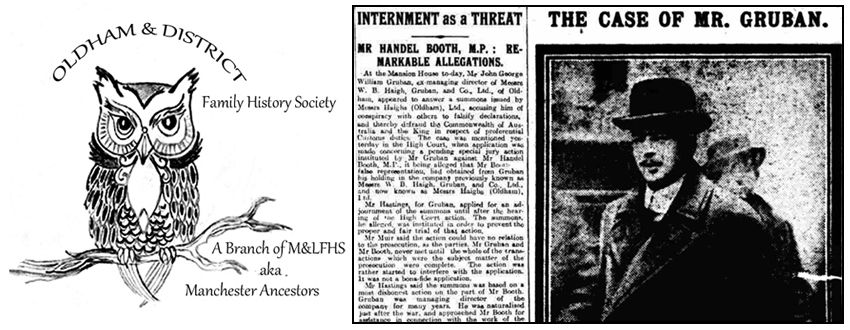
A German Armaments Manufacturer in Oldham During World War One
by Dorothy Bintley
Johannes Georg Wilhelm Gruban was born in Schweinitz, Prussia on February 23rd 1872 to Wilhelm and Emilie Gruban.
In 1891 when he was 19 he was conscripted into the German Army and served for 13 months. On being released in 1892 he moved to London with a job as agent for Kirchner, a German armaments company. This was the start of his permanent residence in England, he anglicised his name to John George William Gruban. He visited Germany from time to time and in 1902 he married Margaret Huldechinsky in Berlin, she came to live with him in London.
In 1908 he bought shares in an Oldham engineering company, Haigh & Co., which had works on Plane Street. He became the Managing Director and the company’s name was changed to Haigh, Gruban & Co. Ltd. His German employers, Kirchner, claimed that his contract with them prevented him from competing with them via a rival company so they issued a writ to restrain him. They had stopped paying him but eventually Gruban won and they had to reimburse him 20,000 marks. He invested this in Haigh, Gruban & Co together with some money he received from his father in law. From 1908 Gruban and his wife took up residence in Oldham, moving in 1913 to live in Bardsley House just over the border in Ashton under Lyne. Liselotte May was born in 1912, Eileen Olga in 1913 and John Douglas in 1915.
By 1914 Gruban had lived in England for over 20 years but had not become a British citizen, with war looming he applied for naturalisation which was granted on August 29th 1914, unusual timing for a man in his position. This started the rumour mills going; a German running a British engineering company which manufactured, among other things, machinery used to make armaments.
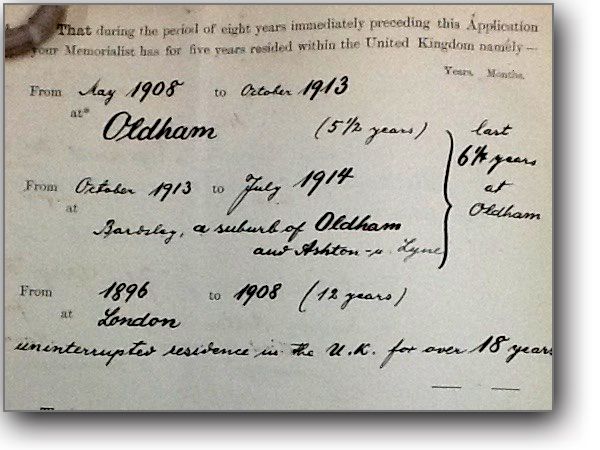
Page from Naturalisation Documents
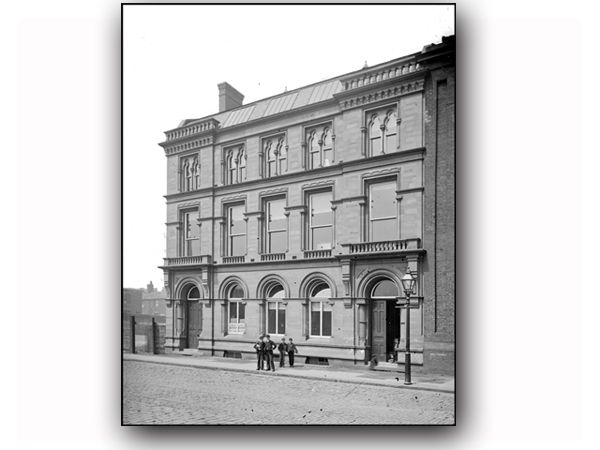
The Reform Club in Oldham
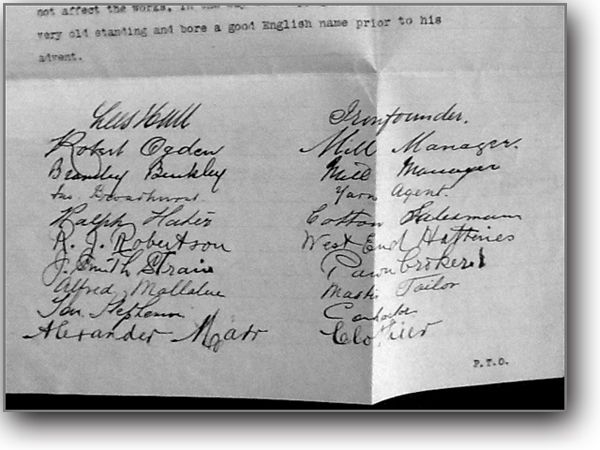
Signatures on the Petition
On October 13th 1914 Oldham Reform Club sent a petition to the Home Office signed by forty one Oldham men:
“To His Majesty’s Principal Secretary of State for the Home Department
We the undersigned Citizens of Oldham feel most strongly that a Commercial Man in Oldham, namely Mr J.G.W. Gruban of Bardsley House nr Oldham, and of the firm of Messrs. W.B. Haigh, Gruban & Co. who, until recently was a German subject and reported to be an Officer of the German Army, has been enabled to obtain, apparently through financial interests, naturalization papers.
Other Germans, less influentially placed, have quite rightly been put under restraint.
This man is directly responsible for the introduction of a large number of German Workmen into the neighbourhood. If he had British interests at heart, why did he not take out naturalization papers before war was declared? We feel that the fact that this man being at large might well be a menace to the welfare of Britain.
We are strongly of the opinion that he ought to be removed from the possibility of active operations and most respectfully ask the Home Department to investigate most carefully the circumstances.
The reason he got his naturalization papers was on the information that he was a large Employer of British labour.
He is the Managing Director of the concern, and his removal would not affect the works, in the way of stoppage, as it is one of very old standing and bore a good English name prior to his advent.”
The Reform Club’s petition was marked “This document is strictly private and confidential” but clearly Gruban heard about it and on October 21st 1914 he sent his own letter to the Home Office:
“Globe Ironworks
Plane Street
Oldham
October 21st 1914
The Right Honourable Reginald McKenna
Home Office
LONDON
Sir,
Numerous prominent members of the Liberal Club (Reform Club), of the Conservative Club and of the Labour Party, have brought it to my knowledge that in pursuance of an agitation a petition has been presented to His Majesty’s Home Office, directed against my naturalization as a British subject.
I am informed that the petition is principally due to the efforts of:
a. Trade adversaries (T. & R. Lees of Hollinwood)
b. A firm of Iron founders with whom my firm had serious litigation regarding a breach of contract (Hall & Co. Ltd, principal Mr. Lees Hall).
The statements therein are entirely without foundation, and are as follows:
1. That I have, or may been, a German Officer.
My reply: I have never held such a position, and beg to humbly refer to the declarations on my application for naturalization which have been fully substantiated.
2. That this firm - W. B. Haigh, Gruban & Co. Ltd. - was either wholly or partially using German castings.
My reply: We do not import and have never imported at any time an ounce of German cast iron (castings) for the manufacture of our machines.
3. That most or part of the workmen are German workmen.
My reply: Out of about 300 men in the works, we have never had more than one German workman at any time; not simultaneously but following each other. Only two German workmen were thus employed during the 7 years, and both were elderly men who had lived in England for practically 20 years, and they held special positions due to their experience.
4. That we imported principally German machines, to the detriment of labour here.
My reply: This is directly opposed to facts, as the steady and immense growth of our Wages Bill and of the British men employed in these works will prove. No German or American machines have been brought to these works at any time except for the purpose of studying the latest inventions, with one object alone, viz: to appropriate these inventions as quickly as possible for the benefit of our own firm, and to become a world’s competitor of American and German firms in our branch of engineering as quickly as possible.
5. That Englishmen were discharged to make room for Germans.
My reply: This is wholly untrue. As our Continental Export Department is entirely new, we employed in this department from two to four foreign clerks - (all of whom have left this firm) as we had to conduct our correspondence in five different languages, thus achieving our aim of capturing foreign trade more quickly, and more thoroughly than it would have been the case under ordinary conditions. In no case however have these German clerks taken the place of Englishmen. To the contrary, they were instrumental in establishing a new (Continental) Export Department, for the benefit of our British workmen.
6. That my naturalization was applied for to protect financial interests only.
My reply: This is contrary to facts, and I refer to my application for naturalization. A very large amount of share capital which was formerly worthless, and held by a large number of British subjects has become worth par as a consequence of the rapid growth and development of the firm in the last seven years.
I humbly beg to inform Your Excellency that conclusive facts relating to all the above are in preparation, together with petitions of gentlemen who really and actually are most intimately acquainted not only with myself, but with this firm.
The completion of these must necessarily take a few days, when they will be delivered without delay.
I am, Sir,
Your most obedient servant
J. G. W. Gruban
The workers of W. B. Haigh, Gruban & Co. Ltd. held a meeting and on October 24th 1914 sent a petition to the Home Office supporting their Managing Director:
The Right Honourable Reginald McKenna Esq., M.P.
Secretary of State for the Home Department
Home Office
Whitehall
LONDON S.W.
Sir,
We, the undersigned workmen, foreman and works employees of W.B. Haigh, Gruban & Company Limited Manufacturers of Sawmill and Woodworking Machines Globe Ironworks Oldham Respectfully beg to make the following statements:
Certain statements have been freely circulated in this town respecting our firm, and especially our Managing Director, Mr J.G.W. Gruban - statements which are incorrect in substance and fact and which are keenly resented by us.
We have therefore held a shop meeting today of all the workmen (excluding apprentices) in a simple plain manner, with the object of taking action against a continuance of these falsehoods being circulated, and as the obvious object is to damage Mr Gruban’s position as a naturalised British citizen, to bring the true facts which are within our own personal knowledge as workmen of the firm, to your notice, viz:
1 It has been freely circulated that the bulk of the raw material used in the manufacture of our machines has been imported from Germany, and that our machines were built of German cast iron.
The true facts:- Not an once of casting has ever been imported from Germany, but they have always been supplied by well known English foundries.
2 It has been circulated that the bulk or a large portion of the workmen employed here were Germans, statements having been wilfully spread in the town that on the day of the outbreak of the war Germans and Austrians, workmen and mechanics, the reports varying from 50, 80, 100 and 200 had been discharged on one day.
The true facts:- During the seven years Mr Gruban has been the head of the firm, we have only seen two German workers inside this works, one an elderly man of about 58, employed as a packer, and the second a machinery demonstrator for special work, for which previously the firm had several Americans. This man was also out of military age, and according to his statement had been married for over 15 years to an English lady. No manager’s or foreman’s position or position of fitter, turner, planer, in the works has ever been filled by a German.
3 It has been circulated that our own British manufacture was gradually subdued, and reduced more and more by the Managing Director having imported in increasing numbers foreign machinery with the object of ultimately wiping out our manufacturers.
The true facts are the exact reverse. Our own manufacture has grown within the seven years by leaps and bounds, giving employment to an ever increasing number of skilled workmen. The growth is phenomenal. The plant of machinery has also been largely renewed and brought up to date. We have also seen brought into these works during these seven years a considerable number of foreign machines of a novel type, not only German, but American, Canadian, Belgian and French, leading invariably one by one to additions and improvements of our older types, and the manufacture of one by one of these novel machines was taken up by our own firm, and then the import of these sample machines was stopped, and the manufacture taken up in our own works, leading to a proportionate increase of our work and number of men employed.
The importations of these foreign machines have steadily decreased until in the Spring of this year they had become practically nil.
Many of us have met and come into personal contact with Mr Gruban during these seven years. We have never observed in his attitude that he has given preference to foreigners; on the contrary, all his efforts were obviously directed to the pushing ahead of our own plant and our own machines, and bringing the reputation of the British built goods of ours in the world’s markets to the highest standard. Several years ago when the firm was altered to the name W.B. Haigh, Gruban & Company Limited, we accepted this as evidence that Mr Gruban was to be one of us for all times.
The undersigned have therefore passed the following resolution unanimously at their meeting;-
That the meeting of the men employed by the above firm hereby assembled strongly resent and repudiate the several false statements circulated in town and district.
That the facts as recorded above are the true facts within our knowledge.
And that a vote of confidence be passed in Mr. Gruban and the firm, and that a copy of this resolution be sent to the Home Office and to the press in Oldham and Manchester.
We are, Sir, Your most obedient servants.”
[134 signatories]
By the middle of 1915 there was a serious shortage of shells for the war effort, one of the specialities of Gruban’s company was the manufacture of lathes used in the production of shells but he needed to raise funds to expand the business so he turned to Frederick Handel Booth, the Liberal MP for Pontefract. He had been introduced to Booth socially a few months previously, at that time Booth had said he could understand the difficulties of Gruban’s position since his own wife was of German extraction; her father was a German who had taken up British Citizenship and her mother was born in Amsterdam. Booth further went on to say that he knew David Lloyd George well and had influence over him. In May 1915 Lloyd George was appointed head of the new Ministry of Munitions.
Things became even more difficult for Gruban after May 7th 1915 when German U-boats torpedoed RMS Lusitania and anti-German sentiments rose. On May 11th the men at Haigh, Gruban & Co came out on strike for a few hours objecting to working with a German who was employed as a fitter. The man was a registered alien, aged about 45 and married to an English woman. Gruban dismissed the man and the workers ended their demonstration but he felt that his own German roots would harm his business so, impressed by Booth’s claim of friends in high places, he turned to him. Booth promised to raise cash to inject into the company and on July 16th 1915 he was appointed the chairman of Haigh, Gruban and Company Ltd. There were soon arguments between the two men about payment of allowances and the Ministry of Munitions began to express dissatisfaction about the running of the company and about Gruban’s perceived German loyalties. Booth persuaded Gruban that the only way forward was for him to transfer the company and all his shares to Booth and this was done.
As soon as Booth had control of the company he turned on Gruban, writing letters to the Ministry of Munitions and the Home Office alleging that in spite of his naturalisation Gruban was a dangerous alien who should be interned.
Lewis Ransome, the head of a rival engineering company based in Ipswich, wrote to the Ministry of Munitions in November 1915 to make sure they knew that Gruban was recently naturalised and was originally German. “Haigh, Gruban & Co are competitors of my firm,” he wrote, “I hope you will not misconstrue my motives in drawing your attention to this matter.”
Gruban was a member of the Oldham Munitions Tribunal. Someone, possibly a junior member of the ministry, wrote in the margin of Ransome’s letter “he should keep his seat” but Christopher Addison who was deputy to Lloyd George, wrote “I think not.” It can be no coincidence that later that month Gruban resigned his position on the Oldham Munitions Tribunal saying, “… my time is taxed to the utmost.”
One of Gruban’s former friends, E. N. Cooper, submitted a document to the Home Office in March 1916, calling into question Gruban’s loyalty to Britain. He first quoted from a letter he had written to the Minister of Munitions:
“I have been up to October 1914, in almost daily contact in business and private life with Gruban for over 13 years. He is a typical German with all their strong points, weaknesses and defects of character.
His sympathies remain German notwithstanding any statements he may have made.
His principles and commercial morality are of a low order and his system of conducting business is largely through espionage.
There is trustworthy evidence that there was always in Gruban’s employ a large number of Germans, usually quite young fellows who were serving or had served in the German army. These men drew small salaries and were subsidised by some Institution in Germany.
They attended office as they thought fit, were allowed frequent leave to Germany and to visit the German Consul in Manchester and were paid privately by Gruban, not by the firm’s cashier.
Gruban himself used to make two or three visits every year to Germany nominally on business … he continually had three German clerks (often men who could not speak a word of English) writing letters in German to Germany, correspondence not filed with that of the firm but kept by him under lock and key.
It was stated that one of these men told Gruban to sit down and remember that he was his superior officer. Gruban at once sat down.
Gruban always spoke disparagingly of everything British. In November 1911 he said to a British employee “Your King and Queen are very nice but not equal to our Kaiser” At Christmas 1912 he had a party at his house and sang “Deutschland uber Alles” and other national songs with his German employees.
On the 3rd October 1914 he informed a former employee that his newly opened branches in Germany were getting along all right and were being properly protected by the Government. He said, “You know how I manage these things.”
A present employee of the firm has reported confidentially that Gruban arranged with a German girl called SCHUTTE, who left at the outbreak of war, to get money from German debtors and to correspond with him by means of a code. This employee saw towards the end of February 1916, a letter in this girl’s writing on Gruban’s desk with a Dutch stamp and the postmark Gravenhagen (or something like that).
His firm have been engaged in the manufacture of machines for munition work In this capacity he has caused grave dissatisfaction to the Ministry of Munitions.”
Gruban’s former friend went on to quote the reply he received from the Minister of Munitions:
“The Ministry of Munitions have decided in the interests of the output of munitions of war to appoint a supervisor to take charge of Messrs. Haigh, Gruban’s business. The reasons for this decision are as follows:
1. The firm have frequently furnished incorrect information to the Ministry of Munitions.
2. They have frequently and deliberately ignored the instructions given by the Ministry for the purpose of expediting the output of machine tools.
3. They have instructed their sub-contractors to disobey the instructions of the Ministry.
4. There is a very strong presumption that they have deliberately attempted by various subterfuges to evade the regulations of the Ministry of Munitions as to the limitations of profits.
5. There is definite proof in some cases, and strong presumption in others, of acts of commercial dishonesty on the part of Mr. Gruban: for example, there is definite proof that.
Mr Gruban himself arranged for the payment of secret commissions to individual members of firms with which he was dealing.
The Ministry of Munitions are reluctant to take over the firm under the Defence of the Realm Regulations and have decided to appoint a supervisor. He will have no power to exclude Mr Gruban from the works until he commits some definite overt act of disobedience to his instructions, but it is, in the opinion of the Ministry, exceedingly probable that if Mr Gruban is left at large he will be able, and will endeavour to interfere with the management of the firm in such a way as to hinder the output of munitions. In the opinion of the Ministry, it is very desirable in the interests of the output of munitions that Mr Gruban should be interned. In this connection, it is important to remember that in the performance of his business he has been in a position to obtain information about the supply of munitions, the location of munition works and other matters affecting munitions of war which would be of considerable value to the enemy: for instance, he has necessarily had access to Woolwich Arsenal and other Government and private factories. This consideration appears to make it very desirable that he should not be left, since if he possesses any feelings of hostility towards this country they will naturally be accentuated by the action of the Ministry intervening in the management of his firm.”
Up to the time of the outbreak of war Gruban was German by nationality and, there is no reason to doubt, also by sentiment. It is impossible to believe that the outbreak of war has made any change in his sympathies. It is clear that he is an able and unscrupulous man, and as is pointed out by the Ministry of Munitions, he has necessarily a very extensive knowledge of war in this country.
In the circumstances it is clear that while at large he is a danger to the public safety and it is recommended that he should be interned.”
The order for Gruban’s internment was made by the Secretary of State for the Home Office on March 25th 1916. Gruban and his lawyers appealed but on April 19th he was arrested in Oldham by the local police and escorted by train to St Mary’s Institution, Cornwallis Road, Islington, a former workhouse which now served as an internment camp. Gruban’s lawyers continued to protest about the internment and on May 16th he was granted bail in the sum of £250 and allowed to move to the Kenilworth Hotel in London. The conditions of his internment were that he resided only at a place approved by the Secretary of State, that he did not travel more than 20 miles without permission and that he did not own a motor car. The internment orders were completely revoked on August 2nd 1916 leaving Gruban free to consider what action he should take against Booth, who in his opinion had stolen Haigh, Gruban & Co. from him. He and his family took up residence in Kent, his wife declaring that she never wanted to visit Oldham again.
Since July 1915, when he had been more or less forced to hand Haigh, Gruban and Co. to Handel Booth, Gruban had received no income from the company. Even after the internment restrictions had been set on Gruban, tBooth continuedo write to the Home Office. In a letter of June 6th 1916 on the company’s headed notepaper he stated:
“It is beyond doubt that Gruban conducted a considerable sale of German machines through this company from 1909 to 1913. Many of these machines were sold as of British make … In view of this continuous and colossal fraud (which was unpatriotic and a gross misuse of our relations with Dominions beyond the seas) I need only express my opinion that it would be most dangerous to place Gruban in a position that he could escape to his native land.”
Now that he was free from internment Gruban sought to regain control of the company and the case of Gruban v Booth opened at the King’s Bench Division of the High Court of Justice in London on May 7th 1917, Gruban was suing Booth for having fraudulently deprived him of his business in Oldham. It was a very high profile case and attracted huge public interest; John George William Gruban, a German business man with interests in munitions against Handel Booth MP who claimed to have influence over David Lloyd George.
The case lasted five days and many column inches in the national newspapers were given over to it. It attracted so much attention from reporters and members of the legal fraternity that the participants found it physically difficult to get into court each day. Although both parties were represented by eminent barristers of the day - Gruban by Patrick Hastings and Hubert Wallington, Booth by Rigby Swift and Douglas Hogg - the case was almost entirely one sided. On the fifth day the jury took just ten minutes to find in favour of Gruban and awarded him £4,750 damages. Booth appealed the damages but before the appeal could be heard in court the two sides agreed that Booth would pay Gruban £3,900.
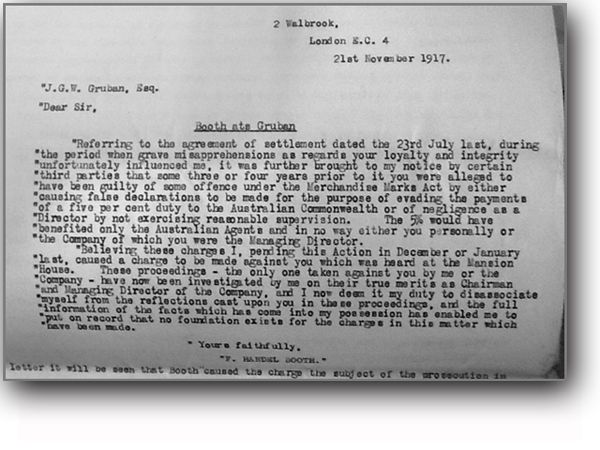
Handel Booth's Public Capitulation
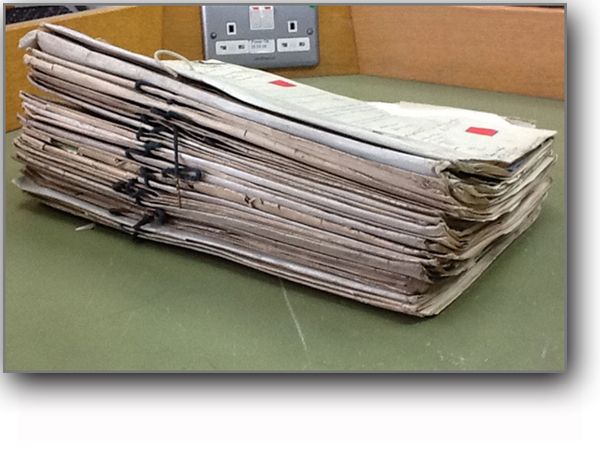
Gruban Document Files at The National Archives
© Dorothy Bintley
Return to the Pictorial Index page (Research/Local Interest)